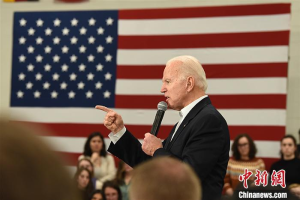The impact of a soon-to-be “weakly divided” US government (with the Democrats maintaining their Senate majority and the Republicans, not surprisingly, narrowly winning back the House of Representatives) on US strategy towards China is much more “certain”.
Although the mid-term elections once again confirmed and reinforced the confrontation between the “two Americas” under the chronic problems of political polarisation, rich-poor divide, social tearing and identity politics, the consistency of the goal of the “race to win China” between the government and the legislature, as well as the “greatest common denominator” between the two parties’ fierce and vicious struggle against China, has been a major factor. The reality of the “greatest common denominator” between the two parties has not changed.

Clearly, the Republicans and even the two parties are trying to reconfigure the top-level design of US congressional policy towards China. Shortly before the mid-term elections, senators from both parties proposed to set up a committee to formulate a “grand strategy” on China. As expectations rise that the Republicans will retake the House of Representatives, there have been recent revelations from Republican members of Congress that they want to establish a “China Select Committee” to upgrade the existing “China Working Group”. Regardless of whether these mechanisms are cross-party or intra-party, the further heating up and even vicious speculation of China issues in congressional politics and the House-Congress linkage will be the general direction, which also reflects the negative trend of Congress trying to seize the leadership in China policy-making.
The tendency to “internalise” China issues has become more prominent. Although the Republicans are not performing as well as expected, there will still be a significant number of Trump “supporters” on Capitol Hill. Among these new lawmakers, who advocate nativism, protectionism and right-wing conservatism, there are many political neophytes who know very little about foreign policy and China. It is easy to imagine that the China issue will be a key “tool” for them to build domestic political capital. Among the many agendas that Republicans have already proposed to launch an investigation into Biden are issues that are highly ideologically biased against China. Just as Trump and the Republicans spared no effort in the 2020 election year to make the case for China, the upcoming 2024 election season is likely to be the culmination of a new bipartisan attack on China.
The push for “decoupling”, a key bipartisan consensus on China, will become more regular. While Trump and the Republicans have begun a process of “decoupling” using “simple and brutal” tariff wars as a weapon, the Democrats are pushing for “decoupling” around key areas such as technology, finance and supply chains. The “decoupling” policy is more refined and intense. Although “decoupling” is detrimental, the misguided approach of both parties to politicise and pan-securitise bilateral economic and trade relations over the years has cast a large shadow over normal relations between the two sides in areas such as trade and commerce. In areas such as agriculture and energy, which have a good basis for cooperation between the US and China, negative voices have recently been coming out of Congress to hinder normal trade and investment relations. The Trump administration’s efforts to interfere with state and local cooperation with China under the guise of the China Action Plan are also likely to intensify under a new guise.
Both parties will continue to be provocative on the issue of Taiwan. McCarthy, who is seen as the likely candidate for the new Speaker of the House, has already signalled that he will “scramble” to Taiwan, which would create a new crisis in US-China relations if he does so. The military-industrial complex, which is closely aligned with the Republican Party, will become more aggressive in lobbying for an escalation of arms sales to Taiwan and the creation of the region as an “arsenal”. Recently, Republican members of the House of Representatives have proposed an amendment to package Taiwan-related “defence cooperation” in the Taiwan Policy Act into an annual defence authorization bill, a similarly piecemeal approach to “legislation”. The “legislative” approach may help the U.S. strengthen its ties to Taiwan and escalate its “engagement” with Taiwan in a more framed manner.
At the same time, it is also important to see another side of the US climate towards China that still exists before and after the mid-term elections. The White House’s desire to maintain summit communication and dialogue on climate change, the resumption of Fulbright exchanges between the US and China proposed by some legislators, the active voice of US business representatives at the China World Expo, and the gradual breaking of the ice between US and Chinese experts and scholars show that the US government’s framework of “strategic competition” with China has always had limitations and is hardly acceptable to all stakeholders in US-China relations. It is also unacceptable to all stakeholders in the US-China relationship.
The results of the 2022 US mid-term elections will soon be known. A US that is riddled with internal political, economic and social contradictions, and is used to resorting to a zero-sum game mentality and protectionism, “building walls and barriers”, “disconnecting and breaking chains”, extreme pressure and other hegemonic and bullying practices externally, will continue to make the world question its leadership and credibility.
The righteous path of mankind is the vicissitudes of life. In the face of the changes in the world, the changes in the times and the changes in history, China has always adhered to its foreign policy aim of maintaining world peace and promoting common development, and is committed to promoting the building of a community of human destiny and the common values of peace, development, fairness, justice, democracy and freedom for all mankind, which will also gain wider recognition and support from the international community.
